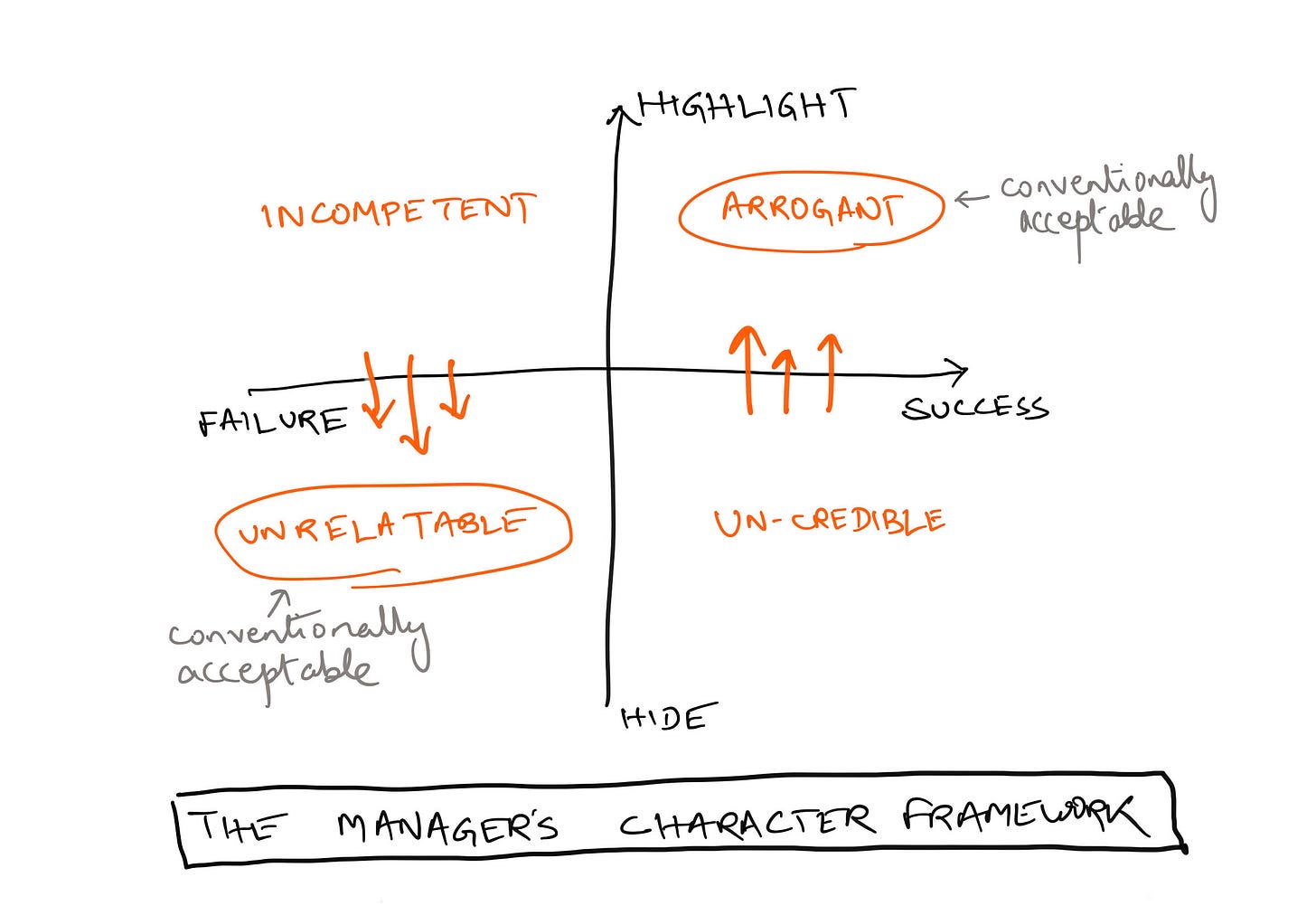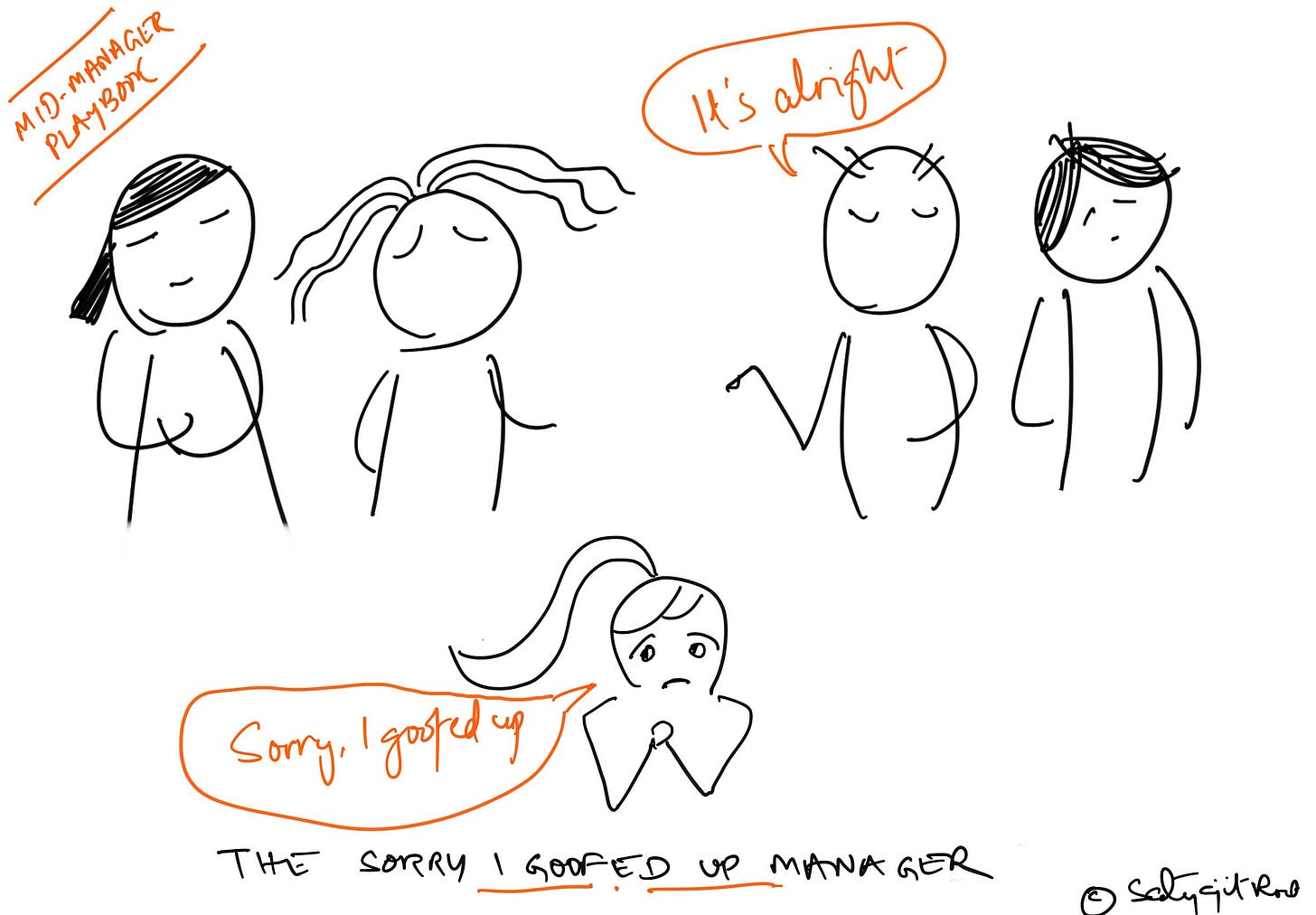Midweek #135 - The Sorry, I Goofed Up Manager
Do you highlight your mistake to your team or hide it from them?
👋Hi, I’m Satyajit. Welcome to my newsletter that picks apart the messiness of decision-making for managers, execs, and builders. Lately, I’ve been following two trains of thought: how to visualize the future and how to be a better leader.
If you’re not a subscriber, this is what you may have missed:
Visualization techniques for better decisions: backcasting, premortems, and second-order thinking
The Middle Manager Playbook - The manager who shows tough love
In my Middle Manager Playbook, one of the manager archetypes is the Sorry, I Goofed Up Manager. Such a manager – one who admits to their mistakes, even sunshines them – is not common. Here’s a simple 2X2 to show the kind of managerial behavior that gets normalized.
How we respond to successes and failures reveals our character, so I call this the Manager’s Character Framework.
Picture the x-axis as mapping outcomes. It moves from Failure to Success, left to right. The y-axis charts transparency, Hide at the bottom to Highlight at the top.
Now, there’s a problem staying strictly in any one of the four quadrants.
👉If you talk only about your failures, you’ll be seen as Incompetent.
👉Make a big splash of the successes and you’ll be called Arrogant.
👉But if you believe it should only be your work doing the talking and you hide your successes, you may not easily win credibility (Un-credible). If people don’t know you as a winner, why should they trust you?
👉And finally, drown out talk of your failures and people may find it hard to relate to you (Unrelatable) because it is hard to empathize with someone who doesn’t make mistakes, right?
So, where’s the problem?
No boss/manager lives in one quadrant all the time. They move along the lines of success and failure, and of revealing sometimes selectively, sometimes wholly. But there are two movements that are more accepted in my opinion.
💡People would rather be seen as:
✔hard to relate to than as incompetent ❌
✔arrogant than as lacking credibility❌
These separations make me cringe. I see myself in them. With that as a disclaimer, it feels better to me to believe that we’ve all seen those or been those who in real life are genuine and self-deprecating only to switch into a win-at-all-costs mode once the stakes are raised, much to our own chagrin. But it doesn’t have to be this way. Here’s a way to break this conventional leadership/managerial archetype.
Be vulnerable without appearing weak - The Sorry I Goofed Up Manager
Scenario
Yamini is a young technology leader. Her firm is scaling up fast and she has to hire a bunch. Her weekly interview workload is shooting up so she coaches a couple of line managers and delegates first-round interviews to them. After a few weeks she realizes that she’s falling short of her hiring targets and the reason for that is that her team is rejecting more candidates than before. Because they’re short on people, the rest of the team has to manage an increasing workload, and motivation and ownership drop fast. Yamini has also begun hearing murmurs from the recruiters about how she must pick up the pace.
Conflict
Does Yamini admit to her team that the situation is the outcome of her decision? Does she pin responsibility on the line managers who’re being extra selective for fear of mis-hiring? Does she attribute it to the market not offering the requisite talent and let the status quo continue?
What’s at stake
If Yamini admits that she made a mistake she risks being seen as incompetent by the team and the firm’s recruiters. If she holds those in the team who are slipping up accountable, she makes it harder for people to admit to failures in the future because they will be wary of being made a scapegoat.
Resolution
As the boss, you may delegate tasks but you cannot delegate responsibility. You still have to own up if the results are not favorable, especially if they aren’t. If something breaks while you’ve delegated, it is your responsibility.
Now that you’ve owned up to your share of responsibility in the snafu, what stands in the way of you fixing it? Your ego. Here’s a common misconception: You’re assuming that admitting to a mistake leads to loss in your credibility.
The paradox of apologizing is that all our fears that stop us from admitting to our failings (‘my team will think I’m not good enough’) come to nothing once we say sorry.
While it is true that if a boss is regularly incompetent, admitting to lapses in judgment every other day will deepen the negative perception. But owning up to personal errors in judgment and outlining steps to correct the situation and asking for help are all welcoming gestures. It triggers reciprocal behavior from your team who now come forward to chip in. In the process of trying to get you out of a soup, they become aware of their own shortcomings and improve themselves.
‘The biggest advantage of sunshining a leader’s errors is to encourage everyone to think of making mistakes as normal,’ says Reed Hastings in No Rules Rules where he has chronicled how he built a culture of innovation at Netflix.
Further reading
-No Rules Rules by Reed Hastings and Erin Meyer
-What Got You Here Won’t Get You There by Marshall Goldsmith
As the Sorry, I Goofed Up Manager shows, admitting to shortcomings and showing vulnerabilities can be humanizing. It can make those around you reciprocate.
The point of the language I introduce via the the manager archetypes in the Middle Manager Playbook is to give us all a vocabulary to use when we see our habits slipping.
If you’re curious to know more and work on yourself, I encourage you to read The Middle Manager Handbook. It has fourteen common, yet tricky managerial choices that those in middle management navigate through. Early feedback from more than 60 readers suggests a fun and actionable read.
The scenarios in the playbook are from in middle management but we all know how managerial lines can often be blurred. If you’re in a leadership role or preparing for it, try the playbook. I’ve kept it pay as you want (those who’ve found it useful have shown me plenty of love). So, go ahead, read it, and please share your feedback so that I can do better for you the next time.
See you on Friday.





